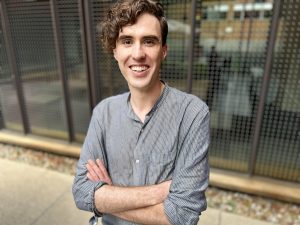
Increases in the average national income in a country do not lead to increased happiness over the long term. The explanation comes from the Easterlin Paradox. At any single given point in time, people with higher incomes may be happier than their lower-income counterparts, but over the long term, a higher income does not lead to greater happiness. Concepts, like the Esterlin Paradox, come from a relatively new field of economic study known as happiness economics. Anthony McCanny, a first year PhD student at the Department of Economics, University of Toronto, has found his intellectual home in the discipline.
“Happiness or well-being economics is still a small, growing field,” said Anthony. “Many prominent economists including Angus Deaton, Daniel Kahneman, Carol Graham and Joseph Stiglitz have advocated for the importance of the field and even worked on well-being economics, but it’s still relatively rare to find working economists at university departments who do happiness economics, especially in North America.”
Anthony helped work on the Canadian Happiness Report compiled by the Population Well-being Lab led by Professor Felix Cheung and housed at the University of Toronto.
Adriano Macedo of the Department of Economics interviewed the graduate student about his research and the inspiration behind his academic choices.
Department of Economics (DoE): Why did you choose economics?
Anthony McCanny (AM): At the beginning, I was motivated by the idea of having an impact on climate change. Ecologists and biologists are tracking the harms that are happening to the natural world, but there’s not a lot of hope or ideas about changing it from the natural sciences. Climate change is a problem created mainly by human activity, so if I wanted to be part of the solution, which meant studying the social sciences. I got interested in political science and economics. The rigor and carefulness of economics made me feel like I fit there.
DoE: When did you decide to pursue the PhD?
AM: Near the end of my undergraduate studies in economics, I got very interested in alternative ways of measuring societal success and utility beyond what is traditionally done. There are a lot of things that make up what a good life is, and those are hard to observe from the outside. I got excited about the idea of incorporating subjective well-being into economics, and I wanted to contribute to that understanding. Happiness economics is where I have been most involved in research so far. I’ve been able to work with the Canadian Happiness Economics Research Network (CHERN), which is a working group of the Canadian Economics Association.
They have focused on two major efforts: Hosting sessions and panels at the annual Canadian Economics Association conference and organizing a regular seminar series around well-being research. Next year we are hoping to give out student awards for the best well-being economics papers. I’ve been involved in putting together the McGill-University of Toronto Well-being Research Seminar, our monthly seminar series in well-being research: we’ve had talks from some amazing researchers like John Helliwell, the UBC economist who has been leading the World Happiness Report and Ruut Veenhoven, a pioneer of the study of happiness in sociology. We are on break for the summer, but in the fall will come back with a new series of online seminars exploring important topics in happiness economics. In the fall I’m hoping to start a well-being economics reading group in the department.
DoE: It’s early in your career, but can you tell us anything about your research in happiness or well-being economics?
AM: I’m finding that the attempt to measure subjective well-being and satisfaction of people’s preferences provides opportunities in many disciplines and applications of economics. I think that subjective well-being measurement can help solve difficult problems like pricing environmental capital and behavioural welfare analysis for addictive goods where revealed preference approaches break down. Subjective data makes people skeptical, and rightfully so. Right now, what gets me most excited about the well-being economics world is that researchers are turning to finding out how to make reliable and interpersonally comparable measurements of subjective scales.
One interesting insight that came out of this year’s Canadian Happiness Report that I worked on is that subjective well-being data can uncover information that is not captured by other economic indicators. Over the past ten years we see a steady decline in how young people in Canada evaluate their lives. While this likely rings true for many young people in the country, many economic indicators including real income and employment show either no real change or an increase for young Canadians over the same period. We find signs that this decline is associated with mental health and the cultural group people belong to, for example, young people in Quebec are spared most of the decline, but English speakers in Quebec are not.
DoE: Are you a happy person?
AM: I’ve done two undergraduate degrees, worked, and started businesses in between. I’ve lived my 20s trying different things without feeling the need to figure it all out right away. This has made me happy and allowed me to find my way here. It’s a more abstract achievement, but I’m proud of giving myself time to explore.
Return to the Department of Economics website.
Scroll more news.
